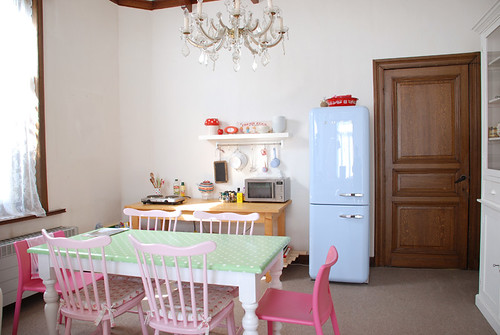Describing your home, place where you live in Polish Posted by Kasia on Apr 22, 2014 in Grammar, Phrases
Poland has all sorts of residential areas. From the post-communist tenement buildings (postkomunistyczne kamienice) of suburban metropolis centres like Warszawa and Kraków, to the quiet rural villages (ciche miejscowości wiejskie) of the quaint and sleepy Polish countryside, and the large ‘outskirt’ neighbourhoods that have more room than inhabitants, there’s a whole range of architecture that makes up Poland’s living buildings. Naturally then, there’s also a whole range of vocabulary and sentences to go with it.
Being able to describe where you live, with whom you live and in what type of building, is a simple and useful skill. It will open up avenues in general conversation, and it’s something that is required very often in a formal register. From signing Polish rental agreements, meeting with landlords, applying for insurance, or bank accounts, and even ordering a pizza, along with casual ‘pub’ talk, this is great vocabulary to get used to.
Describing Where You Live
The question ‘gdzie mieszkasz?‘, is a common one. It means simply ‘where do you live’, so it frequently pops up in casual conversation. To answer, you can simply reply with the same verb (‘to live’ [mieszkać]), in the first person singular, followed by the preposition ‘in’ (w) and the place it is you live: mieszkam w Polsce (I live in Poland), mieszkam we Wrocławiu (I live in Wrocław). (Notice that there’s a difference here in the conjugation of the endings for different places; this is true across the board and has to do with the case rules surrounding talking about locations in conjunction with the ‘w’ preposition.)
To say what type of house you live in, you can use the same sentence opener (‘mieszkam‘) and the same preposition, followed by the noun that describes your type of house in the locative case: Mieszkam w domu (I live in a house), mieszkam w mieszkaniu (I live in a flat). (Here it’s the ‘u’ ending conjugation that signifies the use of the locative case). Other places you may want to say you live are szeregówki (terraced house), bliźniak (semi-detached house [literally twin house]), łódź (boat, [remember though that there is a Polish city by the same name, so to mean boat you’ll need to exchange the preposition ‘w’ and use the conjugated phrase na łodzi]).
Saying Who You Live With
You may also be asked who you live with (z kim mieszkasz?). You answer by using the same verb ‘to live’, but this time with the conjunction ‘with’ (z): Mieszkam z moją rodziną (I live with my family), mieszkam z dwoma współlokatorami (I live with two housemates). You may also want to say you live with your parents (z rodzicami), on your own (sam/sama), or maybe even with your animals (ze zwierzętami).
Giving Your Address
There’s many situations when you may be asked to give your address in Polish (on forms, ordering a pizza, or getting a taxi). The word for address is adres, and post code/zip code is kod pocztowy. When giving your address in Polish, its normal to list your house and flat number after the name of the street, followed by the five digit postcode, if it’s required.
Do następnego razu… (Till next time…)

Build vocabulary, practice pronunciation, and more with Transparent Language Online. Available anytime, anywhere, on any device.
About the Author: Kasia
My name is Kasia Scontsas. I grew near Lublin, Poland and moved to Warsaw to study International Business. I have passion for languages: any languages! Currently I live in New Hampshire. I enjoy skiing, kayaking, biking and paddle boarding. My husband speaks a little Polish, but our daughters are fluent in it! I wanted to make sure that they can communicate with their Polish relatives in our native language. Teaching them Polish since they were born was the best thing I could have given them! I have been writing about learning Polish language and culture for Transparent Language’s Polish Blog since 2010.





Comments:
Flavia Okrent:
Thank you very much for your article. It’s very helpful for me. Can You please write more?